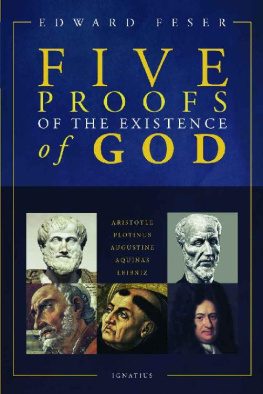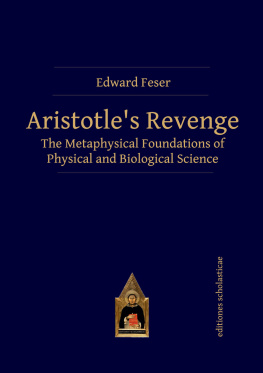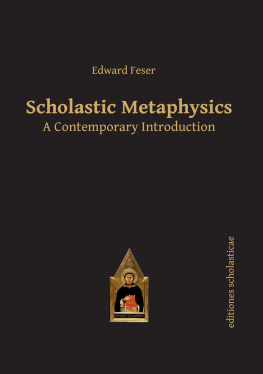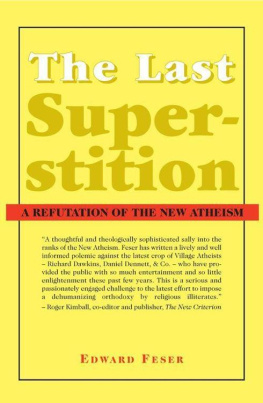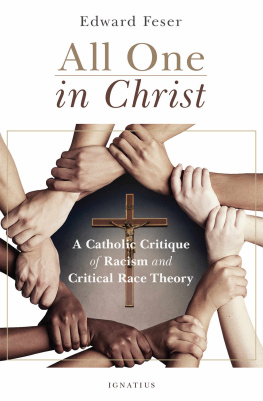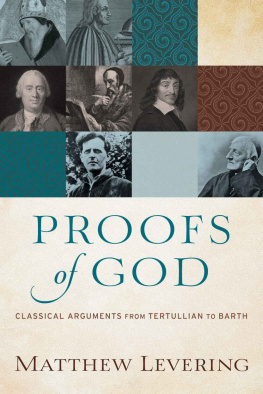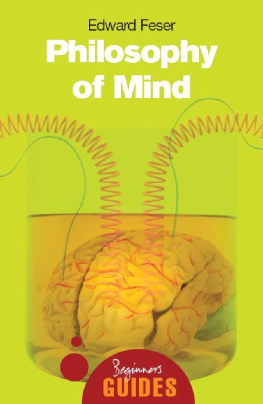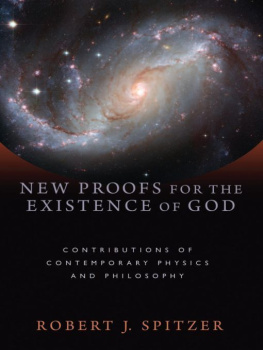Edward Feser - Five Proofs of the Existence of God
Here you can read online Edward Feser - Five Proofs of the Existence of God full text of the book (entire story) in english for free. Download pdf and epub, get meaning, cover and reviews about this ebook. year: 2017, genre: Religion. Description of the work, (preface) as well as reviews are available. Best literature library LitArk.com created for fans of good reading and offers a wide selection of genres:
Romance novel
Science fiction
Adventure
Detective
Science
History
Home and family
Prose
Art
Politics
Computer
Non-fiction
Religion
Business
Children
Humor
Choose a favorite category and find really read worthwhile books. Enjoy immersion in the world of imagination, feel the emotions of the characters or learn something new for yourself, make an fascinating discovery.
- Book:Five Proofs of the Existence of God
- Author:
- Genre:
- Year:2017
- Rating:5 / 5
- Favourites:Add to favourites
- Your mark:
- 100
- 1
- 2
- 3
- 4
- 5
Five Proofs of the Existence of God: summary, description and annotation
We offer to read an annotation, description, summary or preface (depends on what the author of the book "Five Proofs of the Existence of God" wrote himself). If you haven't found the necessary information about the book — write in the comments, we will try to find it.
Five Proofs of the Existence of God — read online for free the complete book (whole text) full work
Below is the text of the book, divided by pages. System saving the place of the last page read, allows you to conveniently read the book "Five Proofs of the Existence of God" online for free, without having to search again every time where you left off. Put a bookmark, and you can go to the page where you finished reading at any time.
Font size:
Interval:
Bookmark:
FIVE PROOFS OF THE EXISTENCE OF GOD
EDWARD FESER
Existence of God
IGNATIUS PRESS SAN FRANCISCO
Front cover images:
First row (left): Aristotle , bust, Roman copy after a Greek bronze,
original by Lysippos, 330 B.C.
National Museum of Rome, Ludovisi Collection
First row (right): Plotinus , marble bust, Ostia Antica Museo, Italy
Second row (left): St. Augustine by Sandro Botticelli (14441510),
in the church of Ognissanti, Florence, Italy
Second row (middle): St. Thomas Aquinas by Carlo Crivelli (ca.14301495),
National Gallery, London, England Second row (right): Gottfried Wilhelm Leibniz by Christoph Bernhard Francke
(16601729), Herzog Anton Ulrich Museum, Braunschweig, Germany
Wickimedia Commons images
Cover design by Enrique J. Aguilar
2017 by Ignatius Press, San Francisco
All rights reserved
ISBN 978-1-62164-133-9 (PB)
ISBN 978-1-68149-780-8 (EB)
Library of Congress Control Number 2017932705
Printed in the United States of America
I thank Father Joseph Fessio for his interest in this book and for the many helpful comments he provided on its first draft. Some of the material in the book was presented before audiences in Cambridge, Massachusetts; Claremont, California; Lafayette, Louisiana; New York City; and Sydney, Australia. I thank audience members for their comments and questions. I also thank the readers of my blog for their feedback on ideas that made their way into the book.
As always, I thank my wife, Rachel, as well as our childrenBenedict, Gemma, Kilian, Helena, Jack, and Gwendolynfor their patience and love. The writing of this book was especially hectic insofar as it overlapped with work on several other major projects. It could not have been accomplished had my wife not handled so much of the business of our family. Of course this is true of my work in general. Anyone who has found anything of value in that work owes a debt of gratitude to Rachel for making it possible.
My friend Father Thomas Joseph White has been at the forefront of the revival of interest in natural theology among Catholic theologians, as evidenced by his fine book Wisdom in the Face of Modernity: A Study in Thomistic Natural Theology . I have profited much from his work and from our conversations over the last few years. It is with gratitude and admiration that I dedicate this book to him.
This is not a book about Saint Thomas Aquinas Five Ways. Some readers of my earlier books might have supposed otherwise, given that I have defended Aquinas arguments elsewhere and that the title of this book is Five Proofs of the Existence of God . But though there is certainly some overlap with what Aquinas says and with what I have said in other places, this book stakes out somewhat different ground. It is not new ground, exactly, insofar as none of the proofs I will discuss is original with me. But it is different ground insofar as several of these proofs are arguments I have not previously defended at any length. It is also different in that most of these proofs have not received much attention in contemporary philosophy. This is remarkable, given that they have been very prominent historically, and given that they happen to be the most powerful arguments for Gods existence on offer (or so I think). My longtime readers will not be surprised when I say that in my view this tells you nothing about the proofs themselves and everything about the state of contemporary academic philosophy, including philosophy of religion.
Though the arguments are not new in themselves, then, they will be new to most readers, as will much of what I have to say in defense of them. What is distinctive about this book will perhaps be most easily explained by saying something about its origins. In my earlier books The Last Superstition and Aquinas , and elsewhere, I approached questions of natural theologythat is to say, questions about what might be known via unaided human reason, apart from divine revelation, concerning the existence and nature of God and of his relationship to the worldby way of exposition and defense of what Aquinas had to say on the subject. That in turn requires setting out the background philosophical principles concerning the nature of change, causality, contingency, and so forth, that are deployed in his arguments; disentangling the essential ideas from the contingent and erroneous scientific assumptions in terms of which he sometimes expresses them; and so on. It is for that reason that, in both of the books mentioned, the reader has to work through seventy pages of sometimes dense general metaphysics before questions of natural theology are addressed. For another thing, the approach requires confining oneself to the arguments that Aquinas himself happened to think are the most significant ones.
In the years since those books appeared, though, it has occurred to me that there is a place, indeed a need, for a book that approaches things differently. In particular, there is a need for an exposition and defense of certain important arguments for Gods existence that Aquinas himself does not discuss and which have also received insufficient attention in recent work in natural theology. And there is a need for an exposition and defense of all of the most important arguments for Gods existence that is neither burdened with complex and often tedious issues of textual exegesis, nor preceded by any detailed metaphysical prolegomenon, but which simply gets straight to the heart of the arguments and introduces any needed background metaphysical principles along the way.
That is exactly what the present book does. Two of the proofs I defend here can be found in Aquinas, but three of them are not arguments that Aquinas discusses, at least not at length or in the form presented here. Nor is there any exegesis in this book, of Aquinas texts or those of any other great thinker of the past. To be sure, and as the table of contents suggests, the arguments are all certainly inspired by several great thinkers of the pastin particular, by Aristotle, Plotinus, Augustine, Aquinas, and Leibniz. Indeed, I think that the proofs that I defend here capture what is essential to the arguments of these thinkers. But I am not presenting an interpretation of any text to be found in the writings of any of these thinkers, and I am not claiming that any of these thinkers said or would agree with everything I have to say. I defend an Aristotelian proof of Gods existence, but not Aristotles own proof, exactly; an Augustinian proof, but not an exegesis of anything Augustine himself actually wrote; and so forth. And I do not set out any more in the way of background metaphysics than is absolutely necessary before getting into the proofs. As far I am able, I introduce the relevant background metaphysical principles along the way, in the course of their application to natural theology.
Each of the first five chapters of the book is devoted to one of the proofs, and each of these chapters has the following structure. First, I present what I characterize as an informal statement of the argument, in two stages. In stage I, I argue for the existence of something fitting a certain key description, such as (for example) the description an uncaused cause of the existence of things . In stage 2, I argue that anything fitting the description in question must have certain key divine attributes, such as unity, eternity, immateriality, omnipotence, omniscience, and perfect goodness. These presentations are informal in the sense that the arguments are not initially set out in the explicit step-by-step format beloved of contemporary analytic philosophers, but rather in a more discursive and leisurely way. The reasons for this procedure are that I want to make it as easy as possible for readers unfamiliar with philosophy to get into and understand the arguments, and also that I need at various points temporarily to digress into more general issues of metaphysics so as to make clear exactly what is going on in the proofs and to forestall potential misunderstandings or irrelevant objections. To be sure, the discussion does at times get pretty technical. But the aim, in the earlier parts of each of these chapters, is to introduce the reader to these technicalities as gently as is feasible. I want the book to be of interest not only to academic philosophers, but also, as far as possible, to laymen who are willing and able to get into philosophical abstractions if they are given the chance to ease into them gradually. Though we end up, in every chapter, in the deepest part of the deep end of the pool, I always try to start at the shallowest part of the shallow end that I can. (As the reader will discover, this is easier to do with some arguments than with others.)
Next pageFont size:
Interval:
Bookmark:
Similar books «Five Proofs of the Existence of God»
Look at similar books to Five Proofs of the Existence of God. We have selected literature similar in name and meaning in the hope of providing readers with more options to find new, interesting, not yet read works.
Discussion, reviews of the book Five Proofs of the Existence of God and just readers' own opinions. Leave your comments, write what you think about the work, its meaning or the main characters. Specify what exactly you liked and what you didn't like, and why you think so.

